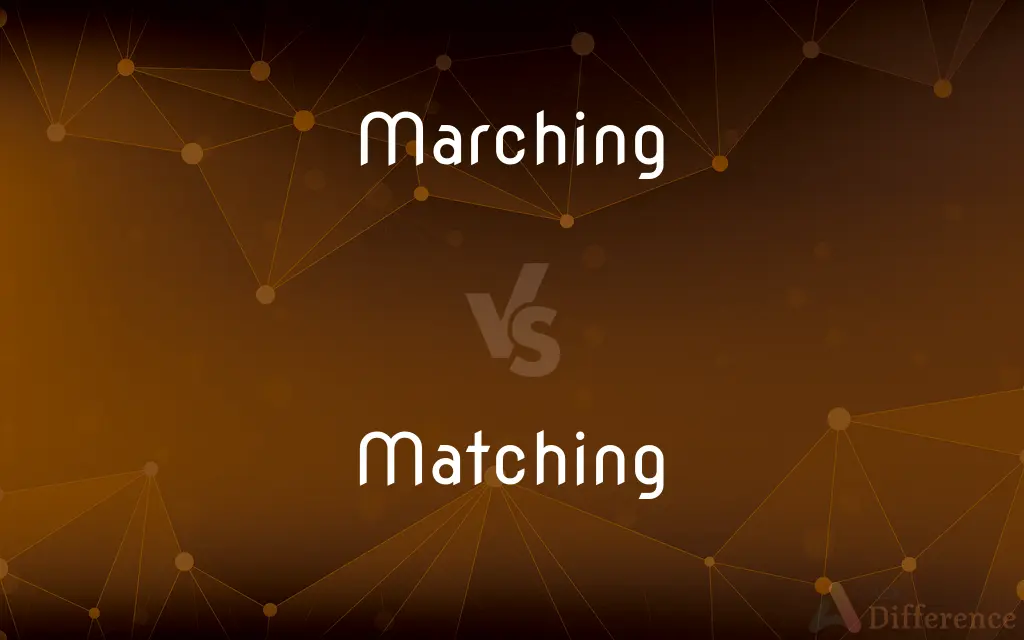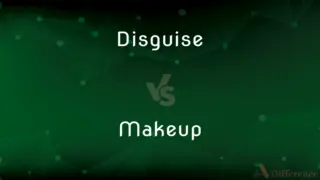Marching vs. Matching — What's the Difference?
By Tayyaba Rehman & Urooj Arif — Updated on March 17, 2024
Marching involves synchronized steps in a group, while matching refers to pairing items or concepts based on similarity.

Difference Between Marching and Matching
Table of Contents
ADVERTISEMENT
Key Differences
Marching is a coordinated, rhythmic movement, usually done by a group, where participants follow a specific pace and pattern. It's often associated with military, bands, and parades. Whereas matching involves identifying similarities or correspondences between items, ideas, or conditions, often used in contexts like fashion, data comparison, or problem-solving.
In marching, uniformity and discipline are key elements, with participants moving as one entity to create visual and sometimes auditory harmony. On the other hand, matching can be more individualistic, focusing on finding complementary elements that align or fit well together, whether in colors, patterns, or concepts.
Marching requires physical movement and coordination, emphasizing spatial awareness and timing to maintain formation and rhythm. Matching, however, relies on cognitive skills like observation, comparison, and decision-making to discern connections or similarities between different entities.
The purpose of marching often revolves around ceremonial, military, or organizational displays, showcasing unity, strength, and collective discipline. In contrast, matching serves various purposes, from enhancing aesthetics in design to forming logical or thematic connections in academic or practical contexts.
While marching is primarily a physical activity with collective participation, matching is a conceptual process that can be both a solitary or collaborative effort, depending on the context and objective.
ADVERTISEMENT
Comparison Chart
Definition
Coordinated movement in unison
Pairing based on similarity
Key Elements
Uniformity, rhythm, discipline
Similarity, complementarity
Skills Required
Physical coordination, spatial awareness
Observation, comparison, decision-making
Primary Context
Military, parades, bands
Fashion, data analysis, problem-solving
Nature
Physical and collective
Cognitive, can be solitary or collaborative
Compare with Definitions
Marching
Synchronized group movement often seen in military parades.
The soldiers were admired for their precise marching during the ceremony.
Matching
Finding correspondences between data sets in research.
The study involved matching patient records from different hospitals.
Marching
A rhythmic walk that involves specific steps, often performed by bands.
The marching band impressed the crowd with their intricate formations.
Matching
Pairing items that are alike in color, pattern, or design.
She enjoyed matching her shoes with her handbag for a coordinated look.
Marching
A form of protest where participants walk together to make a statement.
The community went marching through the city to demand change.
Matching
The process of aligning interests or preferences, as in matchmaking.
The dating app specializes in matching individuals based on shared interests.
Marching
The act of walking with determined steps, especially in difficult circumstances.
Despite the heavy rain, they kept marching towards their destination.
Matching
Aligning similar concepts or ideas in academic or practical contexts.
Matching the right theory to the problem at hand was crucial for the solution.
Marching
A method of moving troops or groups in an organized manner.
The scouts learned different marching techniques during their training.
Matching
Ensuring compatibility between components in a system.
The engineer focused on matching the software with the appropriate hardware for optimal performance.
Marching
Marching refers to the organized, uniformed, steady walking forward in either rhythmic or route-step time; and, typically, it refers to overland movements on foot of military troops and units under field orders. It is a major part of military basic training in most countries and usually involves a system of drill commands.
Matching
One that is exactly like another or a counterpart to another
Is there a match for this glove in the drawer?.
Marching
To walk steadily and rhythmically forward in step with others.
Matching
One that is like another in one or more specified qualities
He is John's match for bravery.
Marching
To begin to move in such a manner
The troops will march at dawn.
Matching
One that is able to compete equally with another
The boxer had met his match.
Marching
To proceed directly and purposefully
Marched in and demanded to see the manager.
Matching
One that closely resembles or harmonizes with another
The napkins were a nice match for the tablecloth.
Marching
To progress steadily onward; advance
Time marches on.
Matching
A pair, each one of which resembles or harmonizes with the other
The colors were a close match.
Marching
To participate in an organized walk, as for a public cause.
Matching
A game or contest in which two or more persons, animals, or teams oppose and compete with each other
A soccer match.
Marching
To cause to move or otherwise progress in a steady rhythmical manner
March soldiers into battle.
Marched us off to the dentist.
Matching
A tennis contest won by the player or side that wins a specified number of sets, usually two out of three or three out of five.
Marching
To traverse by progressing steadily and rhythmically
They marched the route in a day.
Matching
A marriage or an arrangement of marriage
A royal match.
Marching
To have a common boundary
England marches with Scotland.
Matching
A person viewed as a prospective marriage partner.
Marching
The steady forward movement of a body of troops.
Matching
To be like (another) or be a counterpart to
Does this sock match that one?.
Marching
A long tiring journey on foot.
Matching
To resemble or harmonize with
The coat matches the dress.
Marching
Steady forward movement or progression
The march of time.
Matching
To adapt or suit so that a balanced or harmonious result is achieved; cause to correspond
You should match your deeds to your beliefs.
Marching
A regulated pace
Quick march.
Slow march.
Matching
To find or produce a counterpart to
It's difficult to match the color of old paint.
Marching
The distance covered within a certain period of time by moving or progressing steadily and rhythmically
A week's march away.
Matching
To pair (someone) with another in a romantic relationship or marriage
She was hoping to match her cousin with her neighbor.
Marching
(Music) A composition in regularly accented, usually duple meter that is appropriate to accompany marching.
Matching
To place in opposition or competition; pit
She matched her skill against all comers.
Marching
An organized walk or procession by a group of people for a specific cause or issue.
Matching
To provide with an adversary or competitor
The tournament matches the best offensive team with the best defensive team.
Marching
The border or boundary of a country or an area of land; a frontier.
Matching
To do as well as or better than in competition; equal
She easily matches me in bicycle racing.
Marching
A tract of land bordering on two countries and claimed by both.
Matching
To set in comparison; compare
Beauty that could never be matched.
Marching
Present participle of march
Matching
To provide funds so as to equal or complement
The government will match all private donations to the museum.
Marching
An action described by the verb "to march".
Matching
To flip or toss (coins) and compare the sides that land face up.
Marching
That marches.
A marching band
Matching
To couple (electric circuits) by means of a transformer.
Marching
Placed or situated in a line or lines, reminiscent or evocative of marching soldiers.
Matching
To be exactly like another; correspond exactly
Do the two socks match?.
Marching
The act of marching; walking with regular steps (especially in a procession of some kind);
It was a long march
We heard the sound of marching
Matching
To harmonize with another
My shirt and my tie match.
Matching
Present participle of match
Matching
The same as another; sharing the same design.
We bought a new sofa and matching armchairs.
Matching
The process by which things are matched together or paired up.
Matching
(graph theory) A set of independent edges in a given graph, i.e. a set of edges which do not intersect, such that pairs of vertices are "matched" to each other one to one.
Matching
Having identical or closely similar appearance or properties; as, a pair of matching candlesticks.
Matching
Harmonious and pleasing in appearance when used together; as, a matching skirt and blouse.
Matching
Being two identical
Matching
Intentionally matched;
Curtains and walls were color coordinated
Common Curiosities
Can marching serve a practical purpose beyond displays or ceremonies?
Yes, it can also be a method of disciplined movement in various contexts, including emergency evacuations.
What is the main difference between marching and matching?
Marching is about synchronized group movement, while matching involves pairing based on similarities.
Does marching require special training?
Effective marching, especially in formal contexts, often requires training to maintain rhythm, formation, and coordination.
How do cognitive skills play a role in matching?
Matching requires observation, comparison, and decision-making to identify similarities or complementarities.
Can marching be considered a form of matching?
Not directly, as marching focuses on physical synchronization, whereas matching is about conceptual pairing.
Can matching be used in scientific research?
Yes, matching is a common technique in research to compare and contrast data sets or variables.
Is matching always visual?
No, matching can also involve abstract concepts, like ideas or data, not just visual elements.
Are there tools or technologies that assist in matching?
Yes, various software and algorithms are designed to facilitate matching in fields like data analysis, fashion, and matchmaking.
Is marching only related to military activities?
While often associated with the military, marching is also prevalent in cultural parades, protests, and performance arts.
Can marching be a form of exercise?
Yes, it can be a physical activity that improves coordination, stamina, and strength, especially in structured environments like marching bands or military training.
Can matching involve senses other than sight?
Absolutely, matching can engage other senses, such as matching sounds in music or flavors in cooking.
How does marching impact group dynamics?
It can enhance unity and discipline, fostering a sense of collective identity and purpose.
Does the complexity of marching vary?
Yes, marching can range from simple, straightforward steps to complex formations and maneuvers.
In what ways is matching important in daily life?
Matching plays a role in organizing, decision-making, and creating aesthetically pleasing environments.
How does the context affect the process of matching?
The objectives, available items or concepts, and desired outcomes can significantly influence how matching is approached.
Share Your Discovery

Previous Comparison
Disguise vs. Makeup
Next Comparison
Bound vs. BindAuthor Spotlight
Written by
Tayyaba RehmanTayyaba Rehman is a distinguished writer, currently serving as a primary contributor to askdifference.com. As a researcher in semantics and etymology, Tayyaba's passion for the complexity of languages and their distinctions has found a perfect home on the platform. Tayyaba delves into the intricacies of language, distinguishing between commonly confused words and phrases, thereby providing clarity for readers worldwide.
Co-written by
Urooj ArifUrooj is a skilled content writer at Ask Difference, known for her exceptional ability to simplify complex topics into engaging and informative content. With a passion for research and a flair for clear, concise writing, she consistently delivers articles that resonate with our diverse audience.














































